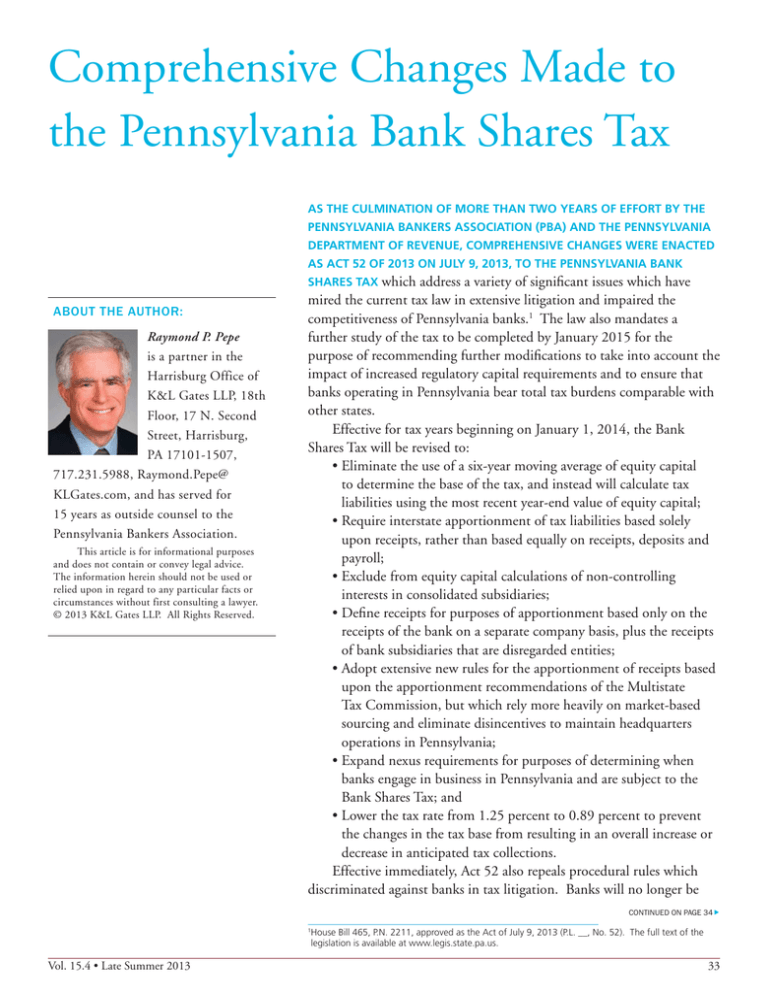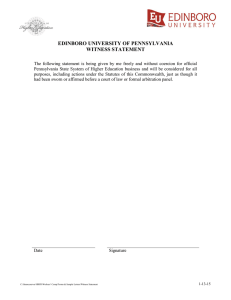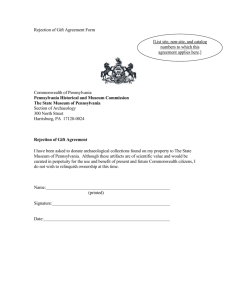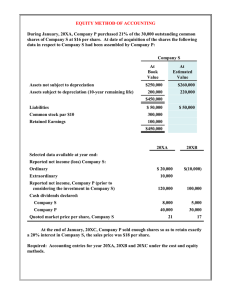
Comprehensive Changes Made to
the Pennsylvania Bank Shares Tax
AS THE CULMINATION OF MORE THAN TWO YEARS OF EFFORT BY THE
PENNSYLVANIA BANKERS ASSOCIATION (PBA) AND THE PENNSYLVANIA
DEPARTMENT OF REVENUE, COMPREHENSIVE CHANGES WERE ENACTED
AS ACT 52 OF 2013 ON JULY 9, 2013, TO THE PENNSYLVANIA BANK
ABOUT THE AUTHOR:
Raymond P. Pepe
is a partner in the
Harrisburg Office of
K&L Gates LLP, 18th
Floor, 17 N. Second
Street, Harrisburg,
PA 17101-1507,
717.231.5988, Raymond.Pepe@
KLGates.com, and has served for
15 years as outside counsel to the
Pennsylvania Bankers Association.
This article is for informational purposes
and does not contain or convey legal advice.
The information herein should not be used or
relied upon in regard to any particular facts or
circumstances without first consulting a lawyer.
© 2013 K&L Gates LLP. All Rights Reserved.
SHARES TAX which address a variety of significant issues which have
mired the current tax law in extensive litigation and impaired the
competitiveness of Pennsylvania banks.1 The law also mandates a
further study of the tax to be completed by January 2015 for the
purpose of recommending further modifications to take into account the
impact of increased regulatory capital requirements and to ensure that
banks operating in Pennsylvania bear total tax burdens comparable with
other states.
Effective for tax years beginning on January 1, 2014, the Bank
Shares Tax will be revised to:
• Eliminate the use of a six-year moving average of equity capital
to determine the base of the tax, and instead will calculate tax
liabilities using the most recent year-end value of equity capital;
• Require interstate apportionment of tax liabilities based solely
upon receipts, rather than based equally on receipts, deposits and
payroll;
• Exclude from equity capital calculations of non-controlling
interests in consolidated subsidiaries;
• Define receipts for purposes of apportionment based only on the
receipts of the bank on a separate company basis, plus the receipts
of bank subsidiaries that are disregarded entities;
• Adopt extensive new rules for the apportionment of receipts based
upon the apportionment recommendations of the Multistate
Tax Commission, but which rely more heavily on market-based
sourcing and eliminate disincentives to maintain headquarters
operations in Pennsylvania;
• Expand nexus requirements for purposes of determining when
banks engage in business in Pennsylvania and are subject to the
Bank Shares Tax; and
• Lower the tax rate from 1.25 percent to 0.89 percent to prevent
the changes in the tax base from resulting in an overall increase or
decrease in anticipated tax collections.
Effective immediately, Act 52 also repeals procedural rules which
discriminated against banks in tax litigation. Banks will no longer be
CONTINUED ON PAGE 34f
House Bill 465, P.N. 2211, approved as the Act of July 9, 2013 (P.L. __, No. 52). The full text of the
legislation is available at www.legis.state.pa.us.
1
Vol. 15.4 • Late Summer 2013
33
Comprehensive Changes Made to the Pennsylvania Bank Shares Tax...CONTINUED FROM PAGE 33
required to pay any contested tax assessments before
seeking review of the assessments and will be subject
to the same three year statute of limitations for refund
claims as other taxpayers, versus a shorter two-year
statute of limitations.
While Act 52 does not adjust the Bank Shares tax to
the PBA’s preferred rate--to offset the impact of increased
regulatory capital requirements which have more than
doubled total Bank Shares Tax liabilities over the past
five years—it does, however, mandate the completion
of a study by the Pennsylvania Department of Revenue,
in consultation with the banking industry and the
Pennsylvania Department of Banking and Securities,
for further recommendations for changes to the tax by
January 2015.
Duncan Campbell, President and CEO of the
PBA, thanked Governor Tom Corbett; Glenn Moyer,
Secretary of the PA Department of Banking and
Securities; Daniel Meuser, the PA Secretary of Revenue;
Senator Pat Browne (R-Lehigh, Monroe, Northampton);
Representative Matt Gabler (R-Clearfield, Elk); the four
chairs of the House and Senate Finance Committees,
House and Senate Leadership; and, each of their
respective staffs for their support of the legislation, which
he described as the key to its successful enactment. He
also thanked the volunteer banker members of the
PBA’s Government Relations Policy and Tax-Financial
Institution Advisory Committees for providing
invaluable advice and direction in the drafting and
negotiation of Bank Shares Tax Amendments, and the
bankers who made grassroots contacts with their local
legislators encouraging enactment of the legislation.
ELIMINATION OF THE SIX-YEAR AVERAGE TO CALCULATE TOTAL
EQUITY CAPITAL
The Bank Shares Tax is currently levied at the
rate of 1.25 percent of a bank’s total equity capital (as
determined using Call Reports filed with the Federal
Reserve Board, the Comptroller of the Currency or the
FDIC) averaged over a six-year period and apportioned
to reflect the portion of a bank’s business conducted
in Pennsylvania. Equity capital is adjusted to exclude
the value of U.S. obligations and goodwill recorded
as a result of the use of purchase accounting for an
acquisition or combination. The tax is due on March 15
of each year, based on the adjusted value of equity capital
calculated for the previous five years, as determined on a
quarterly basis.
The use of the six-year moving average in the tax
base was the result of extensive litigation during the
34
1980s involving the inclusion of the value of U.S.
Treasury Department obligations in equity calculations.
After this litigation culminated in a decision by the
Pennsylvania Supreme Court in Dale National Bank v.
Commonwealth which declared the tax unconstitutional,
the Commonwealth was required to pay refunds
equivalent to approximately eight years of total tax
collections.2 To offset the cost of these refunds, the tax
was increased from 0.75 percent to 10.77 percent for the
1990 tax year. To lessen the impact of this tax increase
on banks that had recently completed mergers, the
higher tax rate was applied to a six-year moving average
of the amount of equity capital.3 While the tax rate was
decreased to 1.25 percent beginning in 1991, the use of
the six-year moving average was continued beyond 1990.
The use of the six-year average to calculate the
value of total equity capital has resulted in extensive
litigation which has exposed both the Commonwealth
and taxpayers to unpredictable liabilities. In First Union
National Bank v. Commonwealth, the Commonwealth
Court (in a decision affirmed by the State Supreme
Court) held that where two banks merge, and one
had no pre-merger tax contacts with Pennsylvania, the
pre-merger equity capital of the out-of-state bank may
not be included in the six-year average value of total
equity capital because of the manner in which banks
subject to tax are described in the Bank Shares Tax
Law.4 More recently, in Lebanon Valley Farmers Bank
v. Commonwealth, the Commonwealth Court also held
that excluding the pre-merger value of equity capital of
out-of-state banks from the six-year average value of total
equity capital makes the tax unconstitutional because
it imposes greater taxes on banks merging with in-state
institutions than is imposed on banks merging with outof-state institutions.5
While the Lebanon Valley Farmers Bank decision
is currently being reviewed by the Supreme Court, the
likely outcome of the appeal may be to require either
the elimination of the use of the six-year moving average
(which would cause significant tax increases for all
banks), or the application of the six-year moving average
to all mergers (which would cause substantial losses
in revenue to the Commonwealth). To prospectively
resolve this problem, for tax years beginning in 2014, the
use of the six-year moving average is eliminated, and the
502 Pa. 170, 465 A.2d 965 (1983).
Act of July 1, 1989 (P.L. 95, No. 21) (72 P.S. § 7701.1(a)).
4
867 A.2d 711 (Pa. Cmwlth. 2005), affirmed 587 Pa. 507, 885 A.2d 112 (2006).
5
27 A.3d 288 (Pa. Cmwlth. 2011).
2
3
Vol. 15.4 • Late Summer 2013
tax is based on book value of equity capital at the end of
the immediately preceding calendar year.6
Depending on the Supreme Court’s decision in
Lebanon Valley Farmers Bank, further adjustments to the
tax may be subsequently required. The Commonwealth
Court held that to adjust for the discriminatory impact
of including the pre-merger value of both institutions
in the six-year moving average when two banks subject
to the Bank Shares Tax merge, but excluding the premerger value of a bank not previously subject to the tax,
the Commonwealth must either pay tax refunds, or seek
legislative authority to retroactively increase tax liabilities
for mergers involving institutions not previously subject
to the tax to the extent refunds are not paid.
APPORTIONMENT BASED ON RECEIPTS
Currently, the tax liabilities of banks “located”
both within and outside of Pennsylvania and subject
to tax in another state, are determined by applying to
equity capital a three factor apportionment formula,
based equally on the portion of deposits, payroll and
receipts received or paid in Pennsylvania calculated as a
percentage of an institution’s total deposits, payroll and
receipts. Effective for January 1, 2014, and thereafter,
the portion of total equity capital apportioned to
Pennsylvania and subject to the Bank Shares Tax will be
based solely on the share of receipts ascribed to business
conducted in the Commonwealth.7
The change in the apportionment formula
is intended to eliminate disincentives to expand
employment and develop bank offices in Pennsylvania.
The amendment mirrors changes made to Pennsylvania’s
Corporate Net Income Tax which, for tax years
beginning after December 31, 2012, apportions income
to Pennsylvania based solely upon sales, rather than
based on sales, payroll and property.8
CALCULATING TAX LIABILITIES USING TOTAL BANK EQUITY CAPITAL
Prior to 2008, the Bank Shares Tax was based
upon the “book value of capital stock paid in, the book
value of the surplus and the book value of undivided
profits.” As part of an amendment to the law enacted
in 2007 to provide an adjustment to the value of equity
to exclude goodwill recorded as a result of the use of
purchase accounting for an acquisition or combination,
the tax base was redefined as “total equity capital”
and determined using Call Reports.9 This change in
Act 2013-52, § 701.1(a) (72 P.S. § 7701.1(a)).
Act 2013-52, § 701.4(1)(ii) (72 P.S. § 7701.4(a)).
8
72 P.S. § 7401(3)(2)(a)(9)(v).
9
Act of July 25, 2007 (P.L. 373, No. 55) (72 P.S. § 7701.1(a)).
6
7
Vol. 15.4 • Late Summer 2013
terminology was not intended to affect the calculation
of the tax, but instead was a housekeeping amendment
designed to incorporate the terminology used in Call
Reports.
Unfortunately, beginning in 2009 Call Report
terminology was revised based upon new consolidation
rules for partially owned affiliates established by
Statement No. 160 adopted by the Financial Accounting
Standards Board, to include the value of non-controlling
interests in consolidated subsidiaries in “total equity
capital” in consolidated financial statements and to
separately record as “total bank equity capital” an
amount of equity which excludes the value of noncontrolling or minority interests in consolidated
subsidiaries.
FASB Statement No. 160 was adopted to bring U.S.
accounting practices into conformity with standards
adopted by the International Accounting Standards
Board. Previously, entities applying international
financial reporting standards reported non-controlling
interests as equity, while entities applying U.S. Generally
Accepted Accounting Principles reported those interests
as liabilities or in the mezzanine section between
liabilities and equity (as was required by the FFIEC).
The goal of FAS 160 was to eliminate a source of noncomparability in financial reporting, while still providing
sufficient information in accounting statements to
distinguish between equity owned by the parent
corporation in a consolidated group, versus equity owned
by persons with “minority” on “non-controlling” interest
in consolidated subsidiaries.
These changes in accounting standards created a
conflict between provisions of the Bank Shares Tax Law
which impose a tax on the equity of an institution,
versus newly adopted accounting standards which now
include in “total equity capital,” but not in bank equity
capital, equity not owned by an institution. While
banks have argued that the 2007 amendments were not
intended to change the tax base, and that including the
value of non-controlling interests in the tax base results
in the unconstitutional taxation of property not owned
by a bank, the Department has insisted that the plain
language of the statute is controlling and since 2009 has
issued assessments adding the value of non-controlling
interests to tax returns filed based upon total bank equity
capital.
Effective for tax returns filed on or after January
1, 2014, the Bank Shares Tax will be calculated based
CONTINUED ON PAGE 36f
35
Comprehensive Changes Made to the Pennsylvania Bank Shares Tax...CONTINUED FROM PAGE 35
on total bank equity capital rather than total equity
capital.10 While this change resolves the dispute
concerning non-controlling interests prospectively, and
may be interpreted as a renunciation of the Department’s
interpretation of the law, it leaves unresolved disputes
concerning this issue pending before the Board of
Appeals, the Board of Finance and Revenue and the
Commonwealth Court.
SEPARATE COMPANY REPORTING OF RECEIPTS
Currently, the Bank Shares Tax does not define
the term “receipts” as used to apportion tax liabilities
to Pennsylvania. The lack of a definition of the term
has led to some inconsistent interpretations of the law
by the Department of Revenue, and some threatened
tax assessments, issued in 2011, which were withdrawn
in favor of addressing the issue in the context of
comprehensive amendments to the Bank Shares Tax.
The legislation resolves these issues prospectively by
defining the term “receipts” on a separate company basis,
plus the receipts of subsidiaries treated as disregarded
entities for purposes of Federal taxation.11
NEW RECEIPTS APPORTIONMENT RULES
For taxes due in 2014 and thereafter, receipts are
apportioned to Pennsylvania based upon a modified
version of the January 11, 2011 receipts apportionment
recommendations of the Multistate Tax Commission.
Separate apportionment rules are provided for:
• Receipts for the lease of real property;12
• Receipts from the lease of tangible personal
property taking into consideration the extent of
use of the property in Pennsylvania;13
• Interest, fees and penalties from loans secured by
real property;14
• Interest, fees and penalties from loans not secured
by real property;15
• Net gains from the sale of loans;16
• Receipts from fees, interest and penalties charged
to card holders;17
• Net gains from the sale of credit card receivables;18
• Card issuer’s reimbursement fees;19
• Merchant discounts;20
Act 2013-52, § 701.1(a) (72 P.S. § 7701.1(a)).
Act 2013-52, § 701.5 (72 P.S. § 7701.5).
Act 2013-52, § 701.4(3)(i) (72 P.S.§ 7701.4(3)(i)).
13
Act 2013-52, § 701.4(3)(ii) (72 P.S. § 7701.4(3)(ii)).
14
Act 2013-52, § 701.4(3)(iii) (72 P.S. § 7701.4(3)(iii)).
15
Act 2013-52, § 701.4(3)(iv) (72 P.S. § 7701.4(3)(iv)).
16
Act 2013-52, § 701.4(3)(v) (72 P.S. § 7701.4(3)(v)).
17
Act 2013-52, § 701.4(3)(vi) (72 P.S. § 7701.4(3)(vi)).
18
Act 2013-52, § 701.4(3)(vii) (72 P.S. § 7701.4(3)(vii)).
19
Act 2013-52, § 701.4(3)(viii) (72 P.S. § 7701.4(3)(viii)).
20
Act 2013-52, § 701.4(3)(ix) (72 P.S. § 7701.4(3)(ix)).
10
11
12
36
• ATM fees;21
• Loan servicing fees;22
• Receipts from services;23
• Receipts from investment and trading assets and
activities;24
• Receipts from the disposition of property;25 and
• All other receipts.26
The Multistate Tax Commission recommendations
are modified by utilizing market based sourcing rules
for receipts from services and all receipts not subject to
a specific apportionment rule. In addition, taxpayers
are given two options for the apportionment of receipts
from investment and trading assets and activities, namely
either apportionment based upon the location at which
trading or investment activities are managed, or based
upon the percentage of all other receipts apportioned
to Pennsylvania. The provision of these options is
intended to avoid imposing a penalty upon institutions
with headquarters or trading activity offices located
in Pennsylvania, while at the same time not unfairly
treating institutions which conduct these activities in
other states.
The new apportionment rules contain an extensive
amount of detailed guidance not provided by current
law which is intended to reduce uncertainty, inconsistent
interpretations and litigation. In addition, the new
rules make the following significant changes to current
apportionment requirements:
• Loan receipts are apportioned based on the
location of real property securing a loan or on the
location of the borrower, rather than based on the
place of origination;
• Services and receipts from activities not subject to a
specific rule are apportioned based on the location
in which the benefit of a service is received, versus
the location at which work necessary to provide the
service occurs;
• Alternatives are provided for the apportionment
of receipts from investment and trading assets and
activities;
• Receipts subject to apportionment include
principal repayments on loans or credit, travel and
entertainment cards; and
• Merchant discounts are not excluded from
apportionment.
Act 2013-52, § 701.4(3)(x) (72 P.S. § 7701.4(3)(x)).
Act 2013-52, § 701.4(3)(xi) (72 P.S. § 7701.4(3)(xi)).
23
Act 2013-52, § 701.4(3)(xii) & (xvi) (72 P.S. § 7701.4(3)(xii) & (xvi)).
24
Act 2013-52, § 701.4(3)(xiii) (72 P.S. § 7701.4(3)(xiii)).
25
Act 2013-52, § 701.4(3)(xiv) (72 P.S. § 7701.4(3)(xiv)).
26
Act 2013-52, § 701.4(3)(xv) & (xvi) (72 P.S. § 7701.4(3)(xv) ( (xvi)).
21
22
Vol. 15.4 • Late Summer 2013
How these new rules work in practice, will require
careful monitoring and evaluation and may result in
future amendments to the Banks Shares Tax law.
EXPANDING THE STANDARD TO DETERMINE NEXUS
In recent years many other states have aggressively
enforced their business tax laws, including laws imposing
taxes on banks, to impose taxes on all businesses
providing services to customers located within their
boundaries provided that the businesses have any sort
of physical contacts with a state. Pennsylvania’s Bank
Shares Tax, by contrast, is imposed only on banks
“located” within the Commonwealth. As a result,
banks located in Pennsylvania are forced to pay taxes to
many states in which they serve customers, while banks
doing business in Pennsylvania, but not deemed located
in the State based on current law, often pay no Bank
Shares Taxes to
Pennsylvania.
Effective
for 2014 and
thereafter, banks
are subject to the
Bank Shares Tax
if they are “doing
business in the
Commonwealth”
and generate
receipts subject to
apportionment to
Pennsylvania in
excess of $100,000.
In particular, nexus
sufficient to make
a bank subject to the tax arises if:
• A bank has any employees in Pennsylvania,
regardless of whether the employees have a “regular
presence” in the State;
• A bank solicits business in Pennsylvania directly
or indirectly through affiliates, or employees,
representatives, independent contractors, or
agents of affiliates, rather than only through its
own employees, representatives or independent
contractors located in the State;
• A bank uses advertising published, produced or
distributed in Pennsylvania;
• A bank holds a security interest, mortgage or lien
in property located in Pennsylvania; and
• A bank has any physical presence in Pennsylvania
for a period of more than one day sufficient
Vol. 15.4 • Late Summer 2013
to create nexus for tax purposes under the
Constitution of the United States.
REDUCED TAX RATE
Effective for 2014 and thereafter, the Bank Shares
Tax rate is reduced from 1.25 percent to 0.89 percent.
This is a revenue neutral rate adjustment (based upon
Department of Revenue projections) which takes into
consideration the impact of expanding the tax base by
eliminating the six-year moving average to determine the
amount of equity capital and disallowing apportionment
reductions associated with the use of employee leasing
affiliates.
Historically, the Bank Shares Tax was one of the
Commonwealth’s most stable taxes with revenues
growing at a rate of approximately 2.8 percent annually
between 1992 and 2007. Over the last five years,
however, total
bank shares tax
receipts have
nearly doubled,
increasing from
$176.2 million
to approximately
$340 million, a
growth rate of
nearly 19 percent
annually. During
this same period
of time, total
Commonwealth
tax revenue has
increased only
3.6% percent or
approximately 0.8 percent annually, and corporate tax
(i.e., corporate net income and capital stock tax) revenue
has decreased by 20.5 percent or 3.8 percent annually.
To maintain competitiveness with most other states
which tax financial institutions on an income rather
than an equity capital basis, and with states such as
Ohio which has significantly reduced its equity based
financial institutions tax to offset the impact of increased
regulatory capital requirements, the PBA recommended
a variety of rate adjustment alternatives. However, there
were concerns about lagging overall revenue growth
and uncertainty regarding the impact of the proposed
structural changes to the tax on bank shares tax revenues.
As a result, the General Assembly enacted a requirement
for the Department of Revenue, working in consultation
CONTINUED ON PAGE 38f
37
Comprehensive Changes Made to the Pennsylvania Bank Shares Tax...CONTINUED FROM PAGE 37
with the Secretary of Banking and Securities, and
banking industry representatives, to complete a study
within the next 18 months and to make further
recommendations for changes in the Bank Shares Tax
law. The study is required to consider:
• “An appropriate tax base on which to calculate tax
liabilities,” including how to take into account the
Supreme Court’s ultimate decision in the Lebanon
Valley Farmers Bank v. Commonwealth litigation.
• “An appropriate tax rate necessary to provide
fair, stable and predictable tax revenues to the
Commonwealth to ensure that the total amount of
tax imposed [on banks] … and the rate of growth
of tax liabilities, will be competitive with taxes
imposed by other states, particularly those adjacent
to [Pennsylvania].”
• “An appropriate methodology to allocate and
apportion the tax base in instances in where the
entire business of a taxpayer [is not conducted
within Pennsylvania].”
no longer required to first pay any tax assessments
before petitioning for reassessment, and the statute of
limitations on refund claims is extended from two to
three years in conformity with the statute of limitations
applicable to other taxes.27
Beginning in April 2014, the tax appeal process
in Pennsylvania will be significantly improved by the
establishment of a revised and independent Board of
Finance and Revenue consisting of the State Treasurer
and two appointed Commissioners appointed by the
Governor with the advice and consent of the Senate.
The Board will also be required to conduct adversarial
hearings, rather than merely providing for brief
opportunities for oral arguments, and will be required to
publish all of its decisions.28
Other legislation recently enacted allows banks
to be organized as limited liability companies, while
continuing to subject banks organized as LLCs to either
the Bank Shares Tax or the Mutual Thrift Institutions
Income Tax.29 PBA
CHANGES TO TAX APPEAL REQUIREMENTS
27
Effective immediately, banks are provided the
same rights and privileges to appeal tax determinations
as other taxpayers. Unlike other taxpayers, banks are
These changes are effectuated by the repeal, effective immediately, of § 1104.1
of the Fiscal Code (72 P.S. § 1104.1) and § 2702(b) of the Tax Reform Code of
1971 (71 P.S. § 9702(b)).
28
Act 2013-52, §§ 2701, 2703.1 & 2704 (72 P.S. §§ 9701, 9703.1 & 9704).
29
Senate Bill 304, P.N. 1210, approved as the Act of July 9, 2013 (P.L. __, No. 67)
(15 Pa.C.S. §§ 8911 & 8925.
2 0 1 3 P E N N S Y LVA N I A B A N K E R S A S S O C I AT I O N
Enrich Your Retirement Experience
with PBA’s Retired Banker Program
Times have changed and so has retirement. The Pennsylvania
Bankers Association’s Retired Banker Program helps you stay active,
engaged, and current with the industry even though you are retired
or semi-retired.
Membership in the Retired Bankers Program offers a unique way to
keep an open door to the industry where you have built your success
and made a difference. This program provides valuable benefits,
helps you keep up with professional and personal contacts and share
your insights and experience with those
whose careers are still in the making. For
more information, or to join for free, please
contact Cindy Wallett, (717) 255-6913,
cwallett@pabanker.com.
38
Vol. 15.4 • Late Summer 2013




